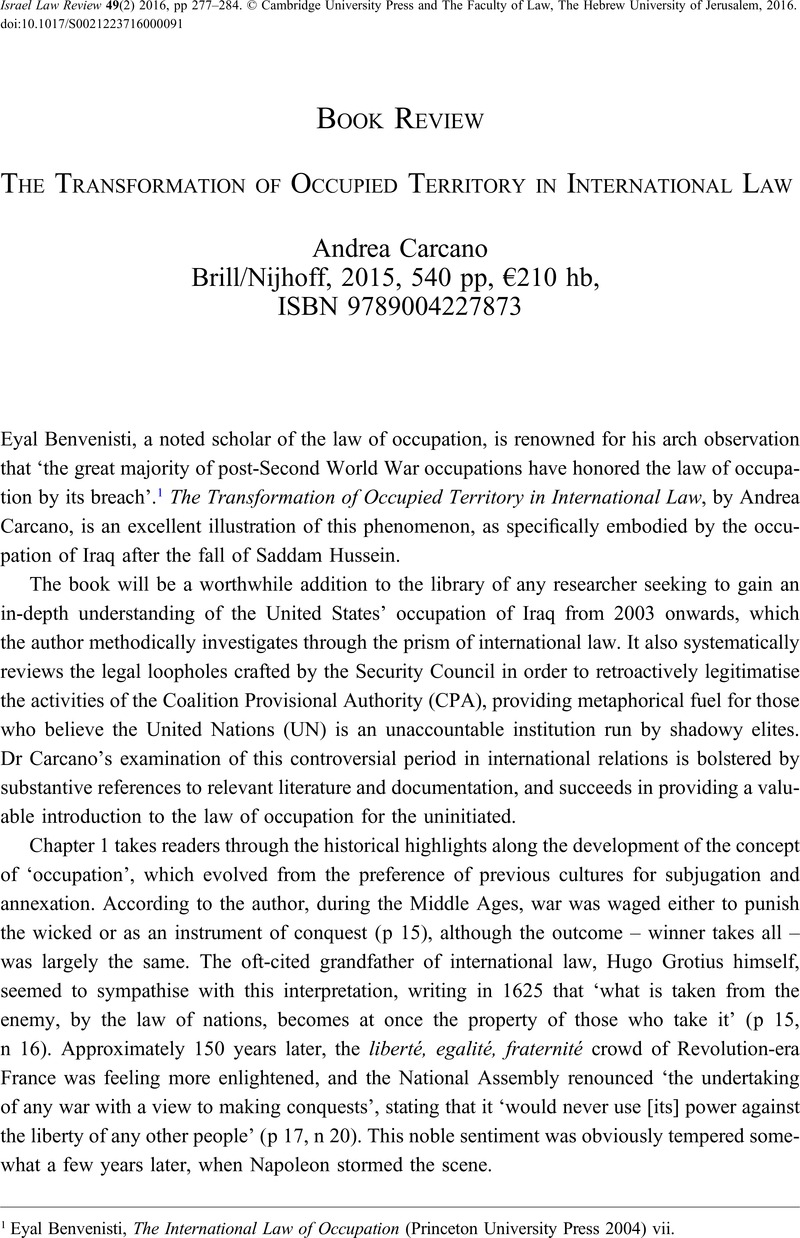No CrossRef data available.
Published online by Cambridge University Press: 26 May 2016

1 Eyal Benvenisti, The International Law of Occupation (Princeton University Press 2004) vii.
2 ibid x.
3 Hague Convention (IV) respecting the Laws and Customs of War on Land and its Annex: Regulations concerning the Laws and Customs of War on Land (entered into force 26 January 1910) Martens Nouveau Recueil (ser 3) 461; Geneva Convention (IV) relative to the Protection of Civilian Persons in Time of War (entered into force 21 October 1950) 75 UNTS 287. The Hague Regulations, in particular, were inspired by the Lieber Code, which is often referred to as the ‘first modern codification of the laws of war’: Baxter, Richard, ‘The First Modern Codification of the Laws of War: Francis Lieber and General Orders No. 100’ (1963) 3 International Review of the Red Cross 171Google Scholar. Based on the work of the then Columbia College (now Columbia University) law professor, Francis Lieber, the Lieber Code was commissioned by US President Abraham Lincoln during the American Civil War for promulgation to Union troops: Giladi, Rotem, ‘A Different Sense of Humanity: Occupation in Francis Lieber's Code’ (2012) 94 International Review of the Red Cross 81, 82CrossRefGoogle Scholar.
4 Legal Consequences of the Construction of a Wall in Occupied Palestinian Territory, Advisory Opinion [2004] ICJ Rep 136.
5 Loizidou v Turkey, App no 15318/89, ECtHR, 18 December 1996; Banković v Belgium, App no 52207/99, ECtHR, 12 December 2001; Al-Skeini v United Kingdom, App no 55721/07, ECtHR, 7 July 2011.
6 The ICRC notes that ‘Article 42 of the 1907 Hague Regulations … states that a “territory is considered occupied when it is actually placed under the authority of the hostile army”. The occupation extends only to the territory where such authority has been established and can be exercised. According to their Common Article 2, the four Geneva Conventions of 1949 apply to any territory occupied during international hostilities. They also apply in situations where the occupation of state territory meets with no armed resistance. Therefore, for the applicability of the law of occupation, it makes no difference whether an occupation has received Security Council approval, what its aim is, or indeed whether it is called an “invasion”, “liberation”, “administration” or “occupation”’: ICRC, ‘Occupation and International Humanitarian Law: Questions and Answers’, 8 April 2004, https:// www.icrc.org/eng/resources/documents/misc/634kfc.htm.
7 ICRC, ‘Expert Meeting Report: Occupation and Other Forms of Administration of Foreign Territory’, March 2012, 69, https:// www.icrc.org/eng/assets/files/publications/icrc-002-4094.pdf.
8 ibid.
9 Robert Baden-Powell, an English aristocrat, was the founder of the worldwide scouting movement, and coiner of aphorisms about camping and the environment. His final letter to the Scouts, which was published after his death in 1941, contained numerous passages that have gone on to be widely quoted by wilderness aficionados, including ‘try and leave this world a little better than you found it’: Robert Baden Powell, ‘Final Letter to Scouts’, https://scout.org/node/19215.
10 The ICJ has found that it does: Wall Advisory Opinion (n 4) paras 114–37.
11 The reference to the US and the UK as occupying powers appears in UNSC Res 1483(2003), 22 May 2003, UN Doc S/RES/1483, Preamble. The US and the UK did not refer to themselves as such, but they both co-drafted and voted in favour of the Resolution.
12 There are literally entire passages ‘lost in translation’ because of the numerous paragraphs and/or footnotes written entirely in French with no English transcription provided.
13 The author does not himself characterise these occupations as ‘successes’ or ‘failures’, but does detail how the societal, political and economic structures of both countries were fundamentally changed in the years following 1945. The author makes careful note of the specific circumstances surrounding the respective occupations of Germany and Japan: in the case of Germany, the unconditional acceptance of the terms of surrender and relative hegemony of the population; in the case of Japan, the example displayed by no less a moral authority than the Emperor, who signed the Instrument of Surrender, and spoke out in favour of the occupation.
14 Proving that conspiracy theories never go out of style.
15 The lack of inclusion of Crimea may be explained by the fact that the book was apparently written during 2013.
16 Wall Advisory Opinion (n 4) paras 90–93.
17 Bhuta, Nehal, ‘The Antinomies of Transformative Occupation’ (2005) 16 European Journal of International Law 721CrossRefGoogle Scholar, particularly n 78 (discussing Roberts, Adam, ‘Prolonged Military Occupation: The Israeli Occupied Territories since 1967’ (1990) 84 American Journal of International Law 44, 48–51CrossRefGoogle Scholar, 96–98).
18 Eyal Benvenisti (n 1) vii–viii (discussing the conflict in the Balkans after the fall of the Soviet Union, the Eritrean-Ethiopian war between 1998 and 2000, and grinding low-level border wars between the Democratic Republic of the Congo and its neighbours over the past 20 years).
19 UNSC, ‘Letter from Permanent Representatives of the UK and the US to the UN addressed to the President of the Security Council’, 8 May 2003, UN Doc S/2003/538.
20 UNSC Res 1483(2003) (n 11) Preamble.
21 Both Italy and Spain took pains to make clear to their domestic parliaments that their participation in the mission would not be as occupying powers, but as ‘humanitarian aid’ or ‘peacekeeping’.
22 For example, Benvenisti (n 1); Bhuta (n 17); Roberts (n 17).